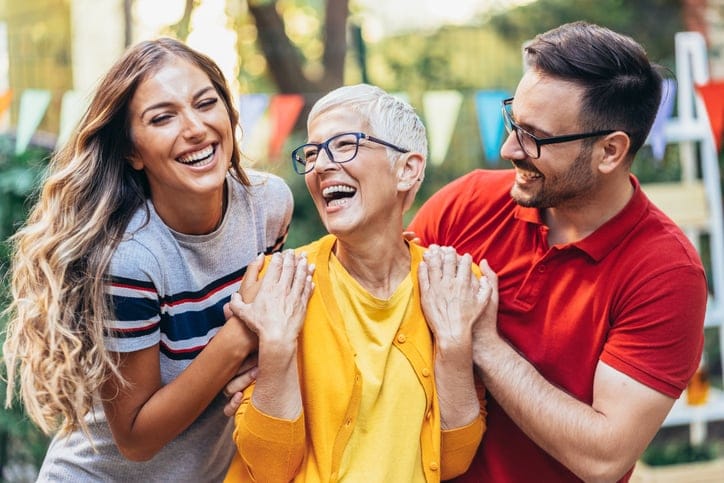Oftentimes, we convince ourselves that our childhoods were terrible when in reality, they were actually pretty average (or even great!) in comparison to what some people go through. If you’ve always told people that life sucked for you growing up, you may want to rethink that stance if you relate to any of these experiences.
1. You have a lot of fond memories.

Sure, there will have been tough times — that’s life for everyone! — but if you can look back and recall moments of happiness, joy, and warmth, your childhood likely had more positive aspects than you remember. These could be simple memories like playing with friends, family get-togethers, or even enjoying your favorite meal with your parent(s) and/or sibling(s).
2. You felt safe.

One of the most important aspects of a good childhood is feeling safe, both physically and emotionally. If you felt protected in your home and knew you could rely on your family for support, it’s a sign that your childhood provided the security necessary for healthy development. You didn’t have to worry that someone would harm you or that you would be left to navigate tough times on your own, and that’s something to be thankful for.
3. You were encouraged to learn and grow.

If your curiosity was nurtured and your mistakes were treated as learning opportunities, it’s a sign of a supportive environment. Having the freedom to explore, make mistakes, and learn from them is crucial for personal growth and self-confidence. The people who raised you encouraged you to become the best possible version of yourself, and that’s a gift.
4. You had consistent routines.

Consistency and structure are often overlooked aspects of a good childhood. Regular routines, like mealtimes, bedtime, and chores, can provide a sense of stability and security that fosters a child’s well-being. Your caregivers set these guidelines to provide you with the structure you needed to feel secure and in control.
5. You were allowed to express your feelings.

Being able to express your emotions openly and without fear of ridicule or punishment is a sign of a healthy upbringing. If your feelings were validated and respected, it gave you the tools to handle your emotions in a healthy way later in life. You weren’t talked over, belittled, or played down.
6. You had positive role models.

Having positive role models in your early years can significantly impact your development. If you were surrounded by adults who demonstrated kindness, respect, and integrity, it likely influenced your understanding of these values. You knew you could look to them to set a good example and show you how to move forward in lif.e
7. You had the opportunity to play.

Play is an essential part of childhood that contributes to social skills, creativity, and cognitive development. If you had plenty of opportunities to engage in unstructured play, it suggests a balance between discipline and freedom in your upbringing. Your parents recognized that you needed to explore and unwind just as much as you needed to buckle down and learn or accomplish. That’s a good balance to have that will serve you well in life.
8. You were taught responsibility.

Learning about responsibility in your childhood, such as having chores or looking after a pet, teaches important life skills like accountability and discipline. It’s a sign that your guardians were preparing you for adulthood. They knew you would need to take on bigger responsibilities when you grew up, so they tried to introduce you to take things on slowly but surely.
9. You felt loved and valued.

Feeling loved for who you are, rather than for your achievements or behavior, is a cornerstone of a good childhood. If you knew you were loved unconditionally, it suggests your childhood was nurturing and supportive. The people who raised you simply wanted what was best for you and for you to be happy — that’s all that mattered.
10. You’ve maintained long-term friendships.

If you still have friends from your childhood, it’s a sign that you had the social skills and emotional capacity to form and maintain long-term relationships, which points to a healthy social environment during your early years. Still BFFs with the same person since third grade? That’s a pretty good sign.
11. You developed resilience.
If you faced adversity but managed to bounce back each time, it suggests that you developed strength and perseverance in your childhood. This ability to cope with setbacks is a sign of emotional strength and is an essential life skill, and it proves that you were well-equipped to handle life’s challenges.
12. You were given the space to be independent.
If you were allowed to do things on your own and make decisions for yourself, it suggests a level of trust and respect from your guardians. This freedom to be independent likely helped you develop self-confidence and decision-making skills.
13. You were exposed to diverse experiences.

If your childhood included exposure to various cultures, viewpoints, and experiences, it suggests a richness in your upbringing that helped broaden your understanding of the world. This exposure fosters open-mindedness and adaptability.
14. You felt heard.

If you felt your opinions and thoughts were listened to and considered, it suggests a level of respect and value for your unique personality. Feeling heard is a vital aspect of building self-esteem and promoting healthy communication skills.
15. You saw conflict being resolved respectfully and constructively.

Witnessing adults in your life manage disagreements or conflicts in a constructive, respectful manner is a valuable lesson. It serves as a model for how to handle conflict and disagreement, which is a critical skill in maintaining healthy relationships.
Enjoy this piece? Give it a like and follow Bolde on MSN for more!





